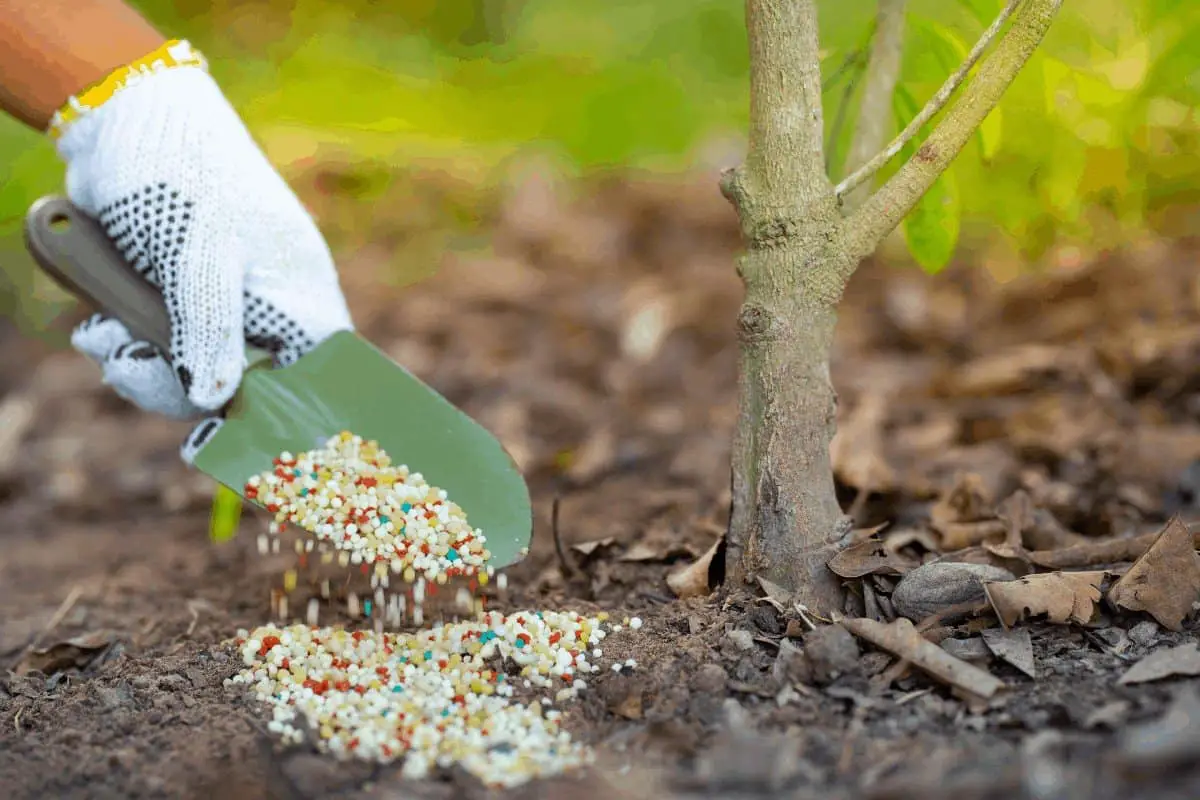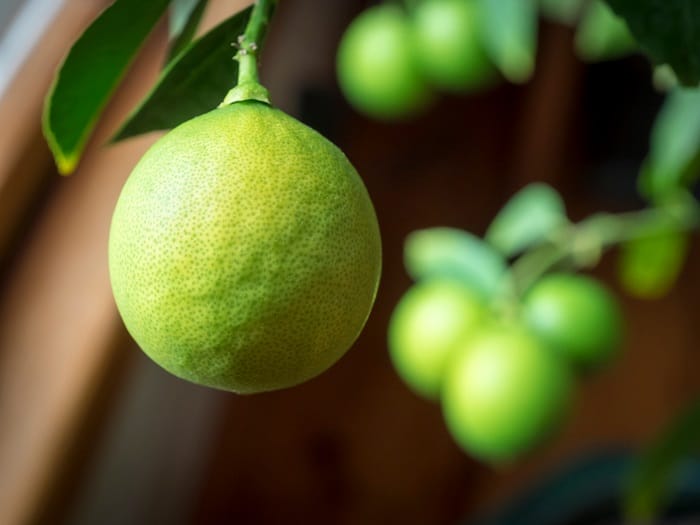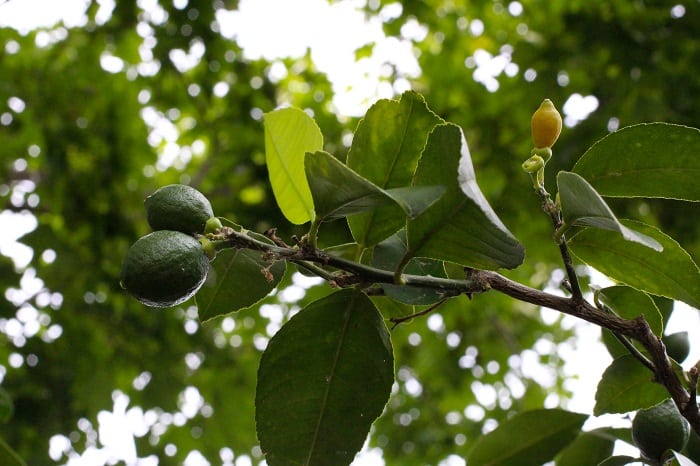Last Updated on January 26, 2022 by Cinthia
Like many other citrus trees, the Meyer lemon requires a specific type of fertilizer to remain healthy and strong. This is especially true if you decide to grow your tree in an enclosed container rather than outdoors since the roots will not be picking up the natural nutrients from the soil and the surrounding environment.
The Meyer lemon is rapidly growing in popularity but is not a naturally occurring fruit. It was developed in China by cross-cultivating a lemon with a mandarin or pomelo, creating a new fruit that combines the taste and nutritional benefits of the lemon and orange. These trees can grow between 6 and 20 ft. tall and have dark, shiny leaves. Before the fruit develops, the tree will be covered in white blooms with purple bases.
Because the Meyer lemon is citric and unique, it is essential to choose the right fertilizer. This guide will identify some of the best options currently on the market, as well as what you should look for when visiting the store.
What to Look for in Citrus Fertilizer
Citrus trees are considered heavy eaters in the gardening world. They require a significant amount of nutrients to produce their fruits, whether it be lemons, oranges, limes, or similar delectables. When searching for the best fertilizer to put on your Meyer lemon tree, you want to pay close attention to the pH, make sure there is plenty of nitrogen, and see if you can get a formula that is slow releasing and easy to apply.
Pay Attention to pH
Perhaps it shouldn’t be surprising, but citrus trees actually enjoy having an acidic environment. Although this acid doesn’t get absorbed into the Meyer lemons themselves, a tree will grow healthy and strong if the soil its roots are embedded in is slightly more acidic and not basic. Acidic pH levels are anything under 7, while a basic level is anything above. The majority of fertilizers will list the pH on the container, so check out the label before purchase.
If you find a fertilizer that does not list a pH, then you can assume that it is neutral and does not lean one way or another. Neutral fertilizers will still be beneficial for your tree but won’t have the same benefits as a truly acidic formulation.
Nitrogen
Nitrogen is the most significant mineral for the majority of citrus plants, and the Meyer lemon tree is no exception. These trees require nitrogen to be able to grow healthy and strong branches, leaves, and delicious lemons. To maintain a healthy and viable output of fruit, even if you have planted your tree outside, it is important to spread regular nitrogen boosting fertilizer around the roots of your tree. If you don’t, then the Meyer lemon can suffer from mineral deficiency and will struggle to grow.
For this reason, the ideal citrus fertilizer will contain extra nitrogen rather than more potassium or phosphorus to create a healthy plant. However, you still need to make sure there are plenty of these other nutrients as well if you want your lemons to grow.
Slow Release
The Meyer lemon tree is a type that grows best when it is allowed to flourish in containers. This means the ideal fertilizer will be slow-releasing, emitting nutrients over a period of time so the soil does not become flooded with unnecessary nutrients. When inside a container, it is important to give the lemon tree regular feedings and to replace fertilizer as frequently as stated on the container. If the tree is not doing well, make sure you are keeping the citrus in the right environment and meeting all of the soil requirements. You can then consider adding fertilizer or switching to a different variety.
Check Out These Citric Stars
1. Jobe’s Organic Fruit and Citrus Fertilizer
Jobe’s Organic Fruit and Citrus Fertilizer are exactly what it sounds like – a 100% organic option designed to improve the overall health and wellness of citrus plants. It is granular and fast-acting, helps new and old trees alike become rejuvenated. Some of the key ingredients include feather meal and bone meal, as well as a proprietary microorganism called Jobe Biozome. The company claims the microorganism breaks down material so the fertilizer works faster.
Besides having a unique microorganism, the ingredients of this fertilizer are straightforward and include plenty of nitrogen with no synthetic chemicals. Jobe’s Organic Fruit and Citrus Fertilizer are available in 1.5 lb. bags and can help the Meyer lemon tree avoid disease, decay, pests, and the other hazards of the growing season.
Pros
- Contains a proprietary microorganism
- Plenty of nitrogen
- Helps rejuvenate older trees
- Organic
Cons
- Contains a proprietary microorganism
- Smells terrible
2. Down to Earth Organic Citrus Fertilizer
One of the immediately alluring characteristics of the Down to Earth Organic Citrus Fertilizer is that it uses simple, natural, and organic ingredients to keep citrus fruits healthy during the growing season. This product has a 6-3-3 formula with plenty of nitrogen and a slow-releasing formula that supplies nutrients to the roots throughout the year. It can be reapplied every 2-3 months for the best results.
This fertilizer also contains some significant secondary ingredients like calcium, zinc, sulfur, and iron as well as essential micronutrients. Other, more traditional, components of the formula include feather meal, fishbone meal, basalt, and kelp meal. Each package contains 1 lb. of fertilizer and is designed to improve the size and health of the fruit that grows. So, you might be able to get some truly massive Meyer lemons using this product.
Pros
- Completely organic formulation
- Includes extra micronutrients to improve health
- Can be reapplied regularly
- Multicolored and easy to see
Cons
- Smells bad
3. Miracle-Gro Continuous Release Citrus Plant Food
Miracle-Gro is one of the most well-known manufacturers of fertilizers, and it is easy to see why. This Miracle-Gro Continuous Release Citrus Plant Food is specifically designed to feed citrus trees, including the Meyer lemon. The product works well on a broad range of old and new trees, and can even be used to rejuvenate trees that have started to wilt or have suffered from a lack of nutrition in the previous months.
This fertilizer is rich in nitrogen but also strives to provide plants with a variety of other essential nutrients like sulfur, iron, magnesium, and potassium. It can be applied every 2-3 months and is designed to prevent dehydration or burning when used properly. Each container has 4.5 lbs., which is enough to keep the tree healthy and satisfied for an entire growing season. The Miracle-Gro Continuous Release Citrus Plant Food can also be used on avocados and mangos.
Pros
- Easy to use in a shake container
- Contains tons of nitrogen
- Can be applied regularly
- Can be used on extra plants like avocados and mangos
Cons
- The pellets do not dissolve well
4. Jack’s Classic Citrus Feed
There are numerous fertilizers currently on the market, but one of the best ones is the Jack’s Classic Citrus Feed. This Meyer lemon fertilizer comes in an easy to use a bucket in granule form. The formula is 20-10-20, meaning it contains plenty of nitrogen and other essential minerals to keep your tree healthy. The manufacturer claims the micronutrient formulation will produce healthier, shinier leaves as well as more vibrant fruit.
Jack’s Classic Citrus Feed can be applied every 2-3 months and is designed not to cause soil burning or damage. It is slightly acidic and also slow-releasing, so your tree will receive the food it needs throughout the year. It can be used on a broad range of tropical fruits and is one of only a few products that mention the Meyer lemon in specific.
Each container holds 1 lb. and includes a scoop for easier portioning. The scoop is roughly the size of a tablespoon, and the plant should be watered after fertilizer is applied.
Pros
- High nitrogen concentration
- Comes with a scoop for better portions
- Slightly acidic pH to boost soil health
Cons
- Expensive for the amount of product received
5. EARTHPODS Premium Fruit and Citrus Plant Food
This fertilizer is useful for both indoor and outdoor fruit trees.
- It boosts flower production
- This fertilizer works on leaf and root growth
- It can be used in several plants and trees like lemon, lime, orange, avocado, tomato, raspberry, tomato, pepper, kumquat trees, strawberry plants, blackberry, blueberry, dwarf banana, and many others. It does not have any smell and has no messes when spraying.
This is a special fruiting flower plant fertilizer. It is robust with a variety of organic plant nutrients, soil life and humates, and trace minerals in a form available to your plants.
It is eco-friendly and compact. You can store it on your kitchen shelf without any harm. You may also reuse the empty paperboard tube for a child or pet. They are 100% sustainably made in the USA.
Feed the plants every 2-3 weeks using this fertilizer for better results.
Directions for use
- Apply flower and plant food capsules every 14-21 days all the way into the soil near the stem.
- Gently open the capsule and spread the contents all around the roots and substrate to feed the plant.
Suggested application rates
Small plants: 1-2 earthpods
Medium plants: 2-4 earthpods
Large plants: 4-8 earthpods
For better results, feed the plants with Earthpods plant food and water the tea drops liquid fertilizer packet.
Store your fertilizer in a safe dry place at cool room temperature. Humid conditions might cause a preliminary breakdown.
Pros
- It is organic and friendly to use
- Can be used in both plants and trees
- It is specially used for flowering
- Comes in a variety of types
Cons
- Costs a bit higher than other fertilizers
6. SOUTHERN Ag – (01902) – Citrus Nutritional Spray
This nutritional spray corrects and prevents deficiencies that cause yellowing. It has 5 balanced essential nutrients that include iron, manganese, zinc, and sulfur. It is used for all ornamentals and fruits. Southern Ag does well in avocados, mangoes, citrus, and other tropical fruits.
This product is best sprayed during winter for normal preventative spray. Apply a thorough cover spray to prevent running off. Use 1 to 2 tablespoons per gallon when spraying.
For prevention of deficiencies: Use 1 tablespoonful per gallon of water and make 1 to 2 applications per year.
For correction of a known deficiency: Use 2 tablespoons per gallon of water to at least make 2 applications at an interval of 2 weeks.
Mature trees require approximately 1 gallon for each foot of height plus 5 gallons of spray.
Before you spray any plant for deficiency, check out to see if the deficiency is brought about by improper pH. Check your soil pH from time to time and adjust when necessary.
Do not mix with other fertilizers, insecticides, or fungicides unless you are sure they are compatible.
Pros
- Prevents and corrects deficiencies
- Used for many types of fruit and ornamental trees
- Easy to mix and spray
Cons
- You cannot mix it with other fertilizers
Conclusion
Although the Meyer lemon tree is quite unique for its distinctive taste and texture, it still has a lot in common with other citrus plants. It requires the right soil and fertilizer to remain healthy and will need a gardener’s tender touch and care to flourish.
When seeking the best fertilizer, you have to look at pH, nitrogen content, and how well the nutrients are released into the soil. Although all of the options on this list are great and will be beneficial, the true winner and best fertilizer for the Meyer lemon tree is Jobe’s Organic Fruit and Citrus Fertilizer. It meets all of the conditions laid out in this list, is completely organic, and is also easy to spread and mix into the soil. It even works well in containers, making it great for the indoor citrus gardener.
Tony Manhart is a passionate gardener who has been tending to gardens for over 20 years. He takes pride in creating beautiful outdoor spaces with plants, trees, and shrubs that can thrive in any environment. He loves to share his knowledge with others and has taught classes on gardening basics and advanced techniques. He is committed to sustainability, using natural and organic methods to create and maintain gardens. He also works with local organizations to create green spaces for communities. When he’s not gardening, Tony enjoys hiking, reading, and spending time with his family.










